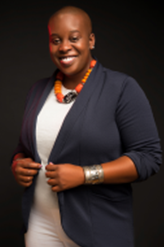

 Souls A’Fire Fellow: Rev. Kyndra Frazier
Souls A’Fire Fellow: Rev. Kyndra Frazier Rev. Kyndra Frazier, was recognized by the Root 100 as one of the Most Influential African-Americans in 2020 for breaking down barriers and paving the way for future generations in the field of mental health. She is a licensed master social worker and a Baptist clergywoman. Kyndra served as the Associate Pastor of Congregational Care and Wellness at First Corinthian Baptist Church, as well as the Founding Executive Director of the HOPE Center, both located in Central Harlem of New York City from 2016–2020. During her tenure there she developed a 6-week Trauma-Informed Church Training series for lay leaders, and was awarded the American Psychiatric Association’s Achievement Award for Innovation in the Mental Health Field. Kyndra is currently the CEO of KYND Consulting Inc., a mental wellness boutique that supports individuals, couples, and organizations in thriving through therapeutic services, spiritual direction, and trauma-informed trainings.
Kyndra believes in the necessity of creating spaces for intentional rest and holistic wellness, and is also the CEO for Selah R&R, Inc. a boutique hotel resort and conference center located right outside of Atlanta, GA, projected to open its doors the Summer of 2024. Contributing to the thriving of the LGBTQ+ community within the African Diaspora is her heart’s desire. She is currently the Co-Producer and Co-Director of A Love Supreme: Black, Queer, and Christian in the South, a life-giving docuseries featuring 8 Black families who are struggling to reconcile the religious bigotry they learned from the pulpit with the immense love they have for their lesbian, gay, bi, queer, and trans identified family members. Kyndrahas been featured in multiple print and digital publications including Vice Magazine, New York Times, Sojourners Magazine, and VoyageATL Magazine. Kyndra holds a Master of Divinity from Candler School of Theology, Emory University, a Master of Social Work from Columbia University, and a Bachelor of Science in Business Management from North Carolina A&T State University.
Abstract Title: Encountering Psychosis: Mental Health, Religiosity, and Queer Identity
There are numerous LGBTQ persons who have struggled with varying mental health challenges that stem from the internal melee instigated when religiosity deems a sexual orientation “deviant”. Historically, misappropriations of scripture and myopic constructions of Jesus have been used to isolate and oppress socially constructed minority groups. In our current context, these practices persist. This paper explores the influence of Christian fundamentalism on the mental health of queer identified persons. Put in conversation with Womanism and Life Course theories, as well as ecclesial and Biblical teachings of Jesus, Black queer narratives in this paper will interrogate the consequences of mental health when one attempts to separate or integrate Christianity and sexuality. Several queries propel this work: What responsibility does Christian religiosity bear for queer persons who battle with suicidal ideation and attempt? Have people resorted to cutting because they desire to numb themselves from feeling the painfulness that integrating their spirituality and sexuality can bring? Has fasting to no longer have same-gender attraction led persons to anorexia? Are LGBTQ persons suffering from an isolating depression because sermonic presentations and biblical misinterpretation have identified them as an abomination? And, what is the role of resistance in black queers’ imaginations about themselves and their relationship with God? It is my hope that by being attentive to the role of resistance in light of the violations Christian fundamentalism can cause to the psyche and spirit, a new framework will emerge for how to provide spiritual support and care to Black queer persons who find themselves in the crux of the struggle to be their authentic selves.